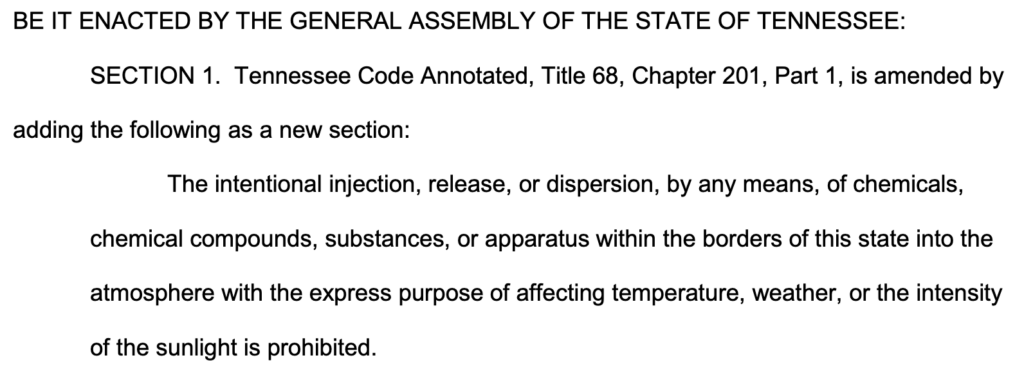Tennessee Senate Bill 2691 apparently began life in January as a simple and probably uncontroversial measure that would have shaved 30 days off the time that a seat on the state’s Air Pollution Control Board could remain vacant before that fact had to be reported to the Legislature:

One could quibble with the conclusion that the public welfare requires early implementation of this change as an emergency measure, which is what section 2 provides. But it probably seemed important at the time.
But at some point between January 31 and last week, it appears that the sponsors of SB 2691 and a companion measure, HB 2063, became aware of a far greater threat to the public welfare than the 180-day vacancy-reporting period. Which seems not to have been an emergency after all, since the committee completely gutted SB 2691 with an amendment that did this instead:


The full Senate passed this bill as amended, on a vote of 25–6, on March 18. So, what’s this all about? What mad scientist is out there polluting the skies of Tennessee with chemicals, substances, or apparatuses with the express purpose of trying to control the weather, and why hasn’t he been arrested already? Maybe a couple of the “WHEREAS” clauses will help:

Or maybe not.
As the Nashville Tennessean (not the most creative name, but they do good work) explains here, what’s going on is chemtrails. Or, rather, a belief in “the chemtrail theory,” which the Tennessean explains is “the belief that the [federal] government is secretly adding toxic chemicals to the atmosphere from aircraft, similar to contrails [the condensation trails that jets leave behind].” Why would it do that? As this Harvard University group puts it, “[v]arious different motivations for this alleged spraying are speculated, including sterilization, reduction of life expectancy, mind control, or weather control.” So in other words, on March 18 there were at least 25 Tennessee senators in a room wearing tinfoil hats.
Is there any evidence that the federal government (or some even more shadowy group) is doing this? Well, as is so often the case these days, there are people on both sides of the issue, but only one side makes any sense at all.
If you’re willing to listen to so-called “scientists,” who are called that because they studied science and follow the scientific method, they haven’t been able to find any evidence this is actually happening. In 2016, for example, a group surveyed experts in atmospheric science (chemists with special experience in atmospheric phenomena) on the topic, and 98.7 percent (76 out of 77) said they had seen nothing in the “chemtrail evidence” to support the theory. They saw other, much more likely explanations for what people had observed. The one dissenter said he found a higher concentration of barium, copper, and manganese in one area than he could explain, but it’s still not clear why he then answered “yes” to the question whether he had “come across evidence that you think indicates the existence of a secret large-scale atmospheric spraying program.” Just because you don’t know the explanation for something yet doesn’t mean you should go ahead and attribute it to a government conspiracy. At least, only 1.3 percent of scientists were willing to do that.
But if you’re willing to open your mind a little and consider, for example, some videos you might see circulating on TikTok and Facebook, then you might end up agreeing with proven truth-hound Alex Jones that there just might be something to all this. “Leading scientist Kylie Jenner” is also “chemtrail curious,” as this article put it, linking to some of Jenner’s Twitter posts suggesting that she believes in chemtrails but not so much in apostrophes. So that’s the other side of that issue.
Which is also now the majority position in the Tennessee Senate, judging by the vote on SB 2691. To be fair, they don’t seem to have signed on to the sterilization, reduction-of-life-expectancy, or mind-control versions of the theory. Or at least they wouldn’t criminalize it if done for those purposes, because the bill refers only to chemtrailing “with the express purpose of affecting temperature, weather, or the intensity of the sunlight.” In other words, this seems to be something about climate change. So they’re proposing to ban something that isn’t real to make a statement about something that is.
Viewing this as a stunt also explains why they don’t seem to be concerned about their ban actually having any effect, which it wouldn’t. This is a state legislature purporting to ban something allegedly being done by the federal government in the air over the state, and presumably not just this state, but the others touched by the same air. If the federal government really wanted to do this, a state law couldn’t stop it (though the state could probably sue under federal or constitutional law). But then a state law couldn’t prevent climate change or federal anti-climate-change efforts, either, and that hasn’t stopped Montana (or at least some Montana legislators) from giving it a shot.
That bill does not seem to have been passed, and the Tennessee Assembly might still prevent further scorn by letting this bill die too. And there is at least some evidence the Assembly might not agree that state chemtrail legislation is urgently necessary. I noticed that the Assembly’s Fiscal Review Committee, charged with evaluating the fiscal impact new legislation may have, declared on February 29 that the impact of this legislation would be “not significant.” It took the opportunity to explain:
It is assumed that the action prohibited by this legislation is not currently occurring in this state, nor will it in the future; therefore, this legislation will result in no significant fiscal impact on state government.
Fiscal Memorandum, HB2063–SB 2691 (Feb. 29, 2024) (emphasis added).
I would have put it less diplomatically (and I guess I just did), but I still congratulate the Committee on pointing this out.


